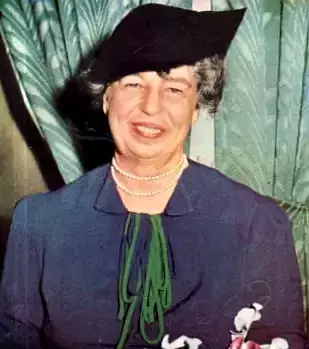
MY DAY
By Eleanor Roosevelt
September 1, 1939
NEW YORK, Thursday – Two things I saw at the World’s Fair yesterday impressed me greatly. If you haven’t seen the little Danish Colony Home, be sure to go there the next time you have a free minute at the Fair. It won’t take you long, for the little house consists of a tiny kitchen, a good-sized closet, four beds built like bunks in two tiers with an alcove which serves as a sitting room and dining room combined. Curtains can be drawn in front of the beds and there is also a little shower-bathroom. The whole house could be scrubbed and cleaned in less than an hour.
These little houses are a part of Denmark’s co-operative scheme for summer holiday making. You lease your small plot of land for two dollars a year and obtain your lumber, seeds, etc., at cost. You have a combination vegetable and flower garden, with a sandbox and playground for the children and a little lawn with a table, where you can eat and sit on pleasant days. Every inch of space is utilized, you even grow your strawberries in a barrel with holes bored in the sides, so you won’t have to give up the ground space. The house and its grounds make an ideal summer vacation spot for people of small means. I can think of many a young couple in this country who would be grateful for something like it near the place where they work.
Then we went to take a look at the “Masterpieces of Art.” Many old “friends,” I was glad to see again, hung on the walls. Some of the early Italians are very satisfying, but I have an especially soft spot in my heart for the examples of Franz Hals, Rembrandt and Velasquez which are shown there. Franz Hals’ portrait of an old lady with a beautiful white ruff around her neck and the exquisite detail of the lace cuffs, which serve as a background for the serene beauty of the old face, is one of the pictures one likes to see over and over again.
My time was too short to do what I really enjoy, namely, sit down in a room where there is a picture I want to see and look at that until its beauty has sunk in sufficiently to stay with me and give me the sense of peace which comes from seeing perfection. Someday, perhaps, I shall have the time to do this, even though that isn’t the way most of us sightsee in our own country.
By 7 o’clock, a small group of us dined together on the porch of my apartment and talked of the world news. We listened to the radio and could hear nothing to give us much encouragement. A talk with Washington provided no final decisions of any kind on the future. Our youngest son called me from the SS Washington to make arrangements for landing today. I tried to decide whether I should take the train to Newport News last night, because the weather still looked somewhat uncertain, or whether I was safe to trust to weather reports which prophesied clear weather for this morning. The Coast Guard called me at 9 p.m. to say that all reports pointed to being able to fly, so I decided to meet the steamer on which my mother-in-law, Johnny and Anne were landing and then fly to Newport News.